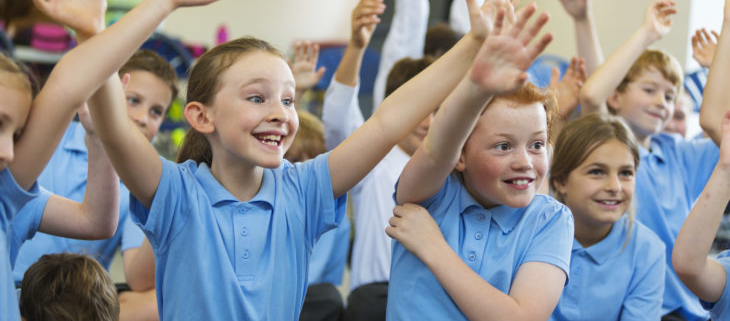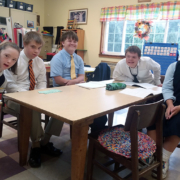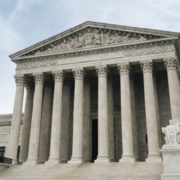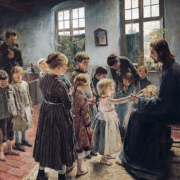Yes, Let’s ‘Expose’ Catholic Schools
Faithful Catholic education is under attack. And since we just celebrated Catholic Schools Week, it’s a great time to launch a counter-offensive that goes beyond clichéd cheerleading for lukewarm schools.
Consider what has occurred over just the last few weeks: First, leftist activists pilloried Second Lady Karen Pence for volunteering at an evangelical Christian school—one that upholds the same standards for teachers that Catholic schools should embrace, when they are courageous enough to insist on the moral formation of their students and the consistent witness of every teacher.
Among the critics was a professor who taught 10 years at the Catholic Dominican University in Illinois. He used the controversy to target not only Pence’s school but all religious schools and colleges with moral standards for employees, calling them “anti-American.” He argued that “no one, anywhere, ever, should risk employment because of who they love or what consensual activities they choose to engage in with other adults.”
Except that such behavior is an example to kids. And if Catholic schools want to claim that teachers are “ministers of the faith” under law—as they should—then pervasive sin ought to be a disqualifier.
Then, as we all witnessed ad nauseum, the media piled on Nick Sandmann and his fellow pro-life students from Covington Catholic School, before realizing that a widely circulated video actually shows that the boys were the victims of an aggressive and hateful confrontation while waiting for their bus home to Kentucky. It’s not the error that was most offensive. It’s the vitriol with which the media quickly turned on pro-life Catholic kids. (Sure, the MAGA hats drew fire too, but I’m convinced that Catholic identity added fuel to the fire.)
To cap it all off, New York Times reporter Dan Levin jumped on the bandwagon and announced plans to write about the social media campaign #ExposeChristianSchools, which was launched as an attack on religious education. I suspect that the Times intended to accumulate allegations of discrimination—especially in the realm of sexuality and gender—but in fact Levin received a flood of very positive reports from Catholic and others defending and celebrating their schools.
Give Your Testimony
So what’s a good Catholic to do about the growing animus toward our faith and Catholic schools? The response to the New York Times project, which resulted in a biased article that could have been much worse had Christians not intervened, suggests a counter-measure. For Catholic Schools Week and throughout the year, let’s keep highlighting the best of the best Catholic education.
To be clear, I’m not particularly interested in the broad marketing messages for Catholic schools that have poured out this week. Although it’s encouraging that our dioceses increasingly promote Catholic identity and are not shy about the mission of Catholic education, nevertheless they are unable to distinguish lukewarm Catholic schools from those that inspire and excite faithful Catholic families.
What would truly be exciting—and what would truly stand up to the anti-Catholic bigots who look to tear down or at least water down Catholic education—is for Catholics to witness to the impact of those Catholic educators who are extraordinary. I mean they are not just great with kids, but they truly lead young people to sainthood.
I’m biased in this project, because for many years The Cardinal Newman Society has been devoted to publicly recognizing model Catholic schools and colleges by our Catholic Education Honor Roll and Newman Guide. This week and every week, my staff already works hard to make Catholic families aware of truly faithful Catholic education—and not just the brick-and-mortar institutions, but also the great blessing of homeschooling to many Catholic students.
But the most powerful testimonials are the personal stories from students, parents, alumni and teachers. Those we can’t produce on our own, but we’re eager to re-tell what others can share.
The truth is, despite the growing secularism that corrupts many Catholic institutions, there is also a renewal of faithful Catholic education that is underway in many homes, schools and dioceses. Instead of cowering before the critics and subversives who hate Catholic moral formation, parents and Catholic educators are taking up the front lines, standing firmly and confidently in the truth of our Catholic faith.
It’s stories of truly faithful Catholic education that others need to hear. Because given the scandals at even the highest levels of the Church, I’m not sure that many Catholics believe the good news when we report it.
Families Need Hope
Think about it: most Catholic adults today have never experienced faithful Catholic education as it should be. We’ve done a poor job of catechesis over the last few decades, and many of today’s adults experienced the post-Vatican II meltdown of schools and their presiding religious orders, followed by the rapid hiring of laypeople who didn’t belong in a Catholic classroom. The rapidly declining enrollment in Catholic schools—which still has not leveled off—means that an increasing portion of Catholics never had even a year or two of weak Catholic education. And of course there’s the shameful secularization of many Catholic colleges since the late 1960s.
We might be tempted to conclude that the era of Catholic education is over in the United States. However, a renewal of faithful Catholic education is key to the renewal of the Church and society—to increased vocations and holy priests, well-formed parents and citizens, doctrinal literacy and fidelity, appreciation for Catholic culture and liturgical beauty, and ability to reason with compassion and respect for the common good. Giving up hope for Catholic education is, in my view, giving up on our youth.
In a time when even celebrated priests and once-admired bishops have let us down, it’s all the more difficult to persuade families of the necessity of sainthood—and the value of forming young people for sainthood. But such formation is the vocation of Catholic parents.
By the Grace of God, there are today young people who have been blessed by truly faithful Catholic education. We need to hear from them… to learn from them.
So, if you can testify to the renewal of faithful Catholic education, please tell your story. Find an outlet: a local newspaper, a Catholic blog, a parish lecture, a letter to your niece. Use the hashtag #FaithfulCatholicEd to share your story on social media—it’s wonderful how many Americans have interrupted this anti-Christian campaign with beautiful stories of faithful religious education. Share your story with me at the Newman Society (president@cardinalnewmansociety.org), and it may help us make a stronger case.
Catholic families need good reason to return to Catholic education and reject hollow secular education. The testimony of those who have been blessed by faithful education is key to bringing them back.
But marketing lukewarm schools and scandalous colleges with state-of-the-art facilities and exorbitant tuitions just won’t cut it.
This article was originally published on January 31, 2019 at the National Catholic Register.




 Photo by David Mark via Pixabay CC0
Photo by David Mark via Pixabay CC0 

